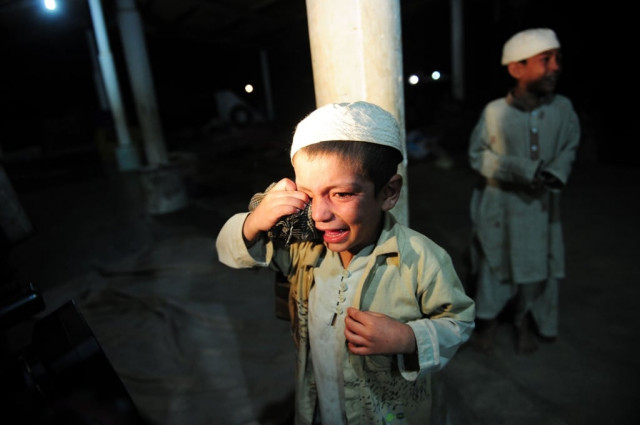Corporal punishment: ‘Religious seminaries are the worst violators’
‘Beating up children should be made a criminal offence’.

Twelve-year old Mohammad Jamil, who was enrolled at a religious seminary a few months ago, died on April 22, allegedly from injuries he sustained when his teacher beat him for not memorising his lesson.
“His teacher hit him on the ribs and abdomen,” his father Mohammad Shafiq told The Express Tribune. Shafiq said that it was the first time his son had been beaten up “so brutally”. He has registered an FIR against the head of the Shadbagh seminary and the teacher.
Corporal punishment at school was banned in 2005 by the Punjab government.
Rashid Aziz, Legal Adviser Unit manager for the Society for the Protection of the Rights of the Child (SPARC) criticised the government for not checking corporal punishment at madrassas even though “it is madrassa students who suffer the most”. He said that the law was vague and flawed. Beating up children has still to be made a criminal offence, he said.
Clause 35 of the Punjab Destitute and Neglected Children Act 2004 says, “Whoever, not being a parent, having the actual charge of or control over a child, willfully assaults, ill-treats, neglects, abandons or exposes him or causes or procures him to be assaulted, ill-treated, neglected, abandoned or exposed or negligently fails to provide adequate food, clothes or medical aid or lodging for the child in a manner likely to cause such child unnecessary mental and physical suffering, shall be punished with imprisonment for a term which may extend to three years or with fine which may extend to fifty thousand rupees or with both: Provided that where some punishment is administered to a child by the person having lawful control or custody of the child, for any good or sufficient reason, it shall not be deemed to be an offence under this section”.
Aziz said the last part of the section justifies corporal punishment.
“We can take action if a kid is tortured at a madrassa and a complaint is lodged with us,” an official at the Child Protection Welfare Bureau told The Tribune.
Published in The Express Tribune, April 29th, 2012.



















COMMENTS
Comments are moderated and generally will be posted if they are on-topic and not abusive.
For more information, please see our Comments FAQ